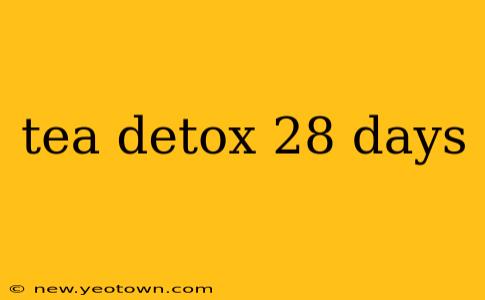The internet is buzzing with promises of miraculous transformations. One such promise, repeated endlessly across countless websites and social media feeds, is the power of a 28-day tea detox. But is this a genuine path to improved health, or just another fleeting trend fueled by marketing hype? Let's explore the reality behind this popular practice, separating fact from fiction.
My journey into the world of tea detoxes began with a simple question: Could a daily ritual of carefully selected teas genuinely contribute to better health and wellbeing over a four-week period? Skeptical, yet intrigued, I embarked on a 28-day experiment, documenting my experiences, researching the science behind the claims, and evaluating the ultimate outcome.
What is a 28-Day Tea Detox?
A 28-day tea detox typically involves replacing some or all of your regular beverages with specific types of tea, often herbal infusions chosen for their purported detoxifying properties. These teas are frequently marketed as aids in weight loss, improved digestion, increased energy, and overall enhanced wellbeing.
The core idea revolves around the belief that these teas can flush out toxins from the body, supporting natural cleansing processes. However, it's crucial to understand that the human body has its own sophisticated detoxification system, primarily the liver and kidneys. While certain teas may offer health benefits, it's essential to avoid overblown claims and understand the nuances of their effects.
Does a Tea Detox Really Work? The Science Behind the Claims
This is where things get interesting. While many teas boast antioxidant and anti-inflammatory properties, the evidence supporting their "detox" claims is often lacking in rigorous scientific research. While some studies suggest potential benefits in specific areas, it's vital to distinguish between anecdotal evidence and proven scientific findings.
Many teas contain compounds that may support various bodily functions, including improved digestion, reduced inflammation, and enhanced immune response. However, these benefits don't necessarily equate to a dramatic "detox" effect as often portrayed.
What Teas are Commonly Used in Detoxes?
Several teas are frequently included in detox programs:
- Green Tea: Rich in antioxidants, it’s often touted for its potential metabolic benefits.
- Ginger Tea: Known for its anti-inflammatory properties and aid in digestion.
- Dandelion Root Tea: A traditional remedy sometimes associated with liver support.
- Milk Thistle Tea: Another herbal tea frequently linked to liver health.
Remember, the efficacy of these teas depends on factors like quality, preparation, and individual health conditions.
What are the Potential Benefits of a 28-Day Tea Detox?
Despite the often exaggerated claims, a 28-day tea detox could offer some potential benefits, provided it's approached responsibly:
- Increased Hydration: Replacing sugary drinks with tea can significantly increase your daily fluid intake.
- Improved Digestion: Certain teas might aid in digestion, reducing bloating and discomfort.
- Enhanced Antioxidant Intake: Many teas are rich in antioxidants, which combat cell damage.
- Potential Weight Management Support: Replacing high-calorie beverages with tea could contribute to a calorie deficit, facilitating weight loss when combined with a balanced diet and exercise.
What are the Risks and Side Effects of a Tea Detox?
While generally considered safe, it's important to be aware of potential drawbacks:
- Nutrient Deficiencies: Replacing meals or essential food groups solely with tea can lead to nutrient deficiencies.
- Dehydration (if not coupled with sufficient water intake): While tea hydrates, it shouldn't replace plain water entirely.
- Medication Interactions: Some herbal teas can interact negatively with certain medications.
- Allergic Reactions: Be mindful of potential allergies to specific herbs or teas.
Is a 28-Day Tea Detox Right for You?
A 28-day tea detox isn’t a magic bullet. Its success hinges on a holistic approach combining mindful hydration, balanced nutrition, and consistent exercise. It's crucial to consult your doctor before embarking on any significant dietary changes, especially if you have underlying health conditions or take medications. The realistic benefits lie in improved hydration and potentially enhanced digestion, not a drastic "detoxification" of the body. A healthy, balanced diet and lifestyle remain the cornerstones of overall wellness.
Remember, sustainable lifestyle changes, not short-term fads, pave the way to long-term health and happiness.

